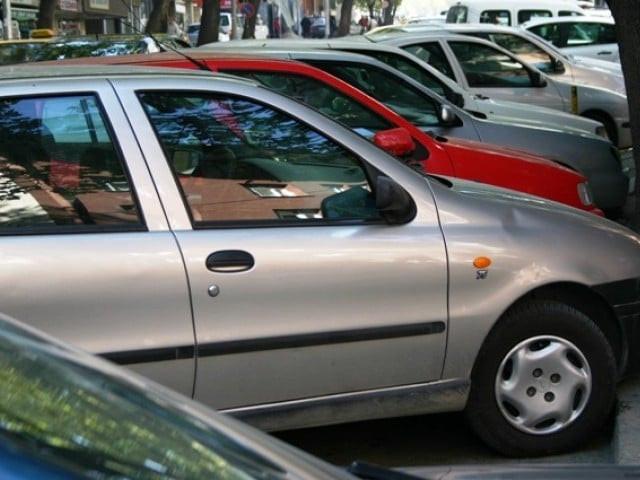Proposed automobile policy: MKD units included, same tax incentives for new and old players
Government opposes import of used cars on a commercial basis to protect local assemblers

FBR opposes decision, questions existing manufacturers’ progress in two decades. PHOTO: FILE
The automobile industry has managed to win over the government and obtained similar tax incentives that authorities have offered to new investors, creating barriers for any European brand in establishing its footprint in the country.
According to official documents, tax incentives and protection extended to existing car assemblers have been offered under a ‘proposed automobile policy’ despite serious objections by the Federal Board of Revenue (FBR).
Although the government has included the definition of Medium Knocked-Down (MKD) units in the automobile category on the demand of German manufacturer Volkswagen, the extension of similar tax benefits to existing players will create issues for the new entrants in setting up their business in Pakistan.
Germany’s biggest and the world’s second largest automobile manufacturer in terms of market share, Volkswagen wants to do business in Pakistan, provided a competitive business environment is available.
Read: Current policy has no place for a German manufacturer: Audi
However, the new investment policy under the Ministry of Industries, tabled in the Economic Coordination Committee (ECC) of the Cabinet on Wednesday, seems to be a nuisance for new investors. The ECC has deferred a decision until the next meeting.
In October 2013, the ECC had constituted a committee to review the automobile policy, which is grossly abused by the existing players to mint money. However, even after two years of work, the document still carried the bonanza of huge benefits for the existing players.
The Committee was chaired by the Minister for Water and Power Khawaja Asif with Privatisation Commission Chairman Mohammad Zubair as his deputy.

From 2009 to 2013, in his capacity as a member of the Public Accounts Committee, Khawaja Asif used to grill car assemblers for fleecing consumers and assembling low quality vehicles. However, when it came to making a difference, he could not take a stand.
In the proposed policy, the government has divided the auto sector into four categories. Category A is marked for Greenfield new investment by a new player, category B is defined for revival of an existing non-operational plant, Category C is meant for the expansion of existing facilities for production of a new variant and category D is included for Greenfield investment by auto parts makers.
Category A
Concerning investment by a new player, the government has proposed 10% custom duties on import of non-localised parts and 25% rate for localised parts for a period of four years. This is for the production of passenger cars and LCVs that are 800 or above cc.
It has offered to allow 100% imports of parts at 10% duties for a period of three years for manufacturing of below 800cc cars. For manufacturing of buses, trucks, tractors and prime movers, the government has offered 100% imports of parts at prevailing custom duties for a period of three years.
MKD operations
The government has offered imports of 100% MKD parts at 25% duty rates for a period of four years for passenger cars to new players. After four years, Completely Knocked Down tariff regime rates will apply. The CKD rates are proposed at 30% for non-localised component and at 45% for localised components.
The government has also offered all incentives, which are currently available under the Special Economic Zones Act to investment in the automobile industry. The new investor will also be allowed to import 100 vehicles of the same model in Completely Build Units form at 25% of the prevailing rate for test marketing.
Category B, C investors
All the tax benefits that the government has offered to the new market players will also be available to existing players. The only difference is the time period. As against the four-year tax incentives, the existing players will avail the facilities for three years.
Read: Govt likely to continue allowing import of used cars
FBR opposition
The FBR has opposed extending any incentive to existing players, either in the name of expansion or revival of non-operational auto assembling units.
“The existing manufacturers have availed concessions for two decades and extending further benefits to them will be of no use,” according to FBR’s comments on the auto policy. “The extension of incentives to the existing players in the name of reviving sick units or expanding the capacity for introduction of new model cars may block entry of new investors”.
The FBR has also questioned the technological advancement by the existing assemblers. There is also no mechanism that ensures that the existing investors will pass on the tax break benefits to the consumers in shape of low prices and better quality.
Consumer interest overlooked in new auto policy
The much-awaited new automobile policy has overlooked the interest of consumers as the government again opposes the import of used cars on a commercial basis, protecting the vehicle assemblers who have been demanding higher prices with no significant addition of new technology.
In the proposed policy, the government has not brought about changes in the existing import rules for used cars and instead decided to plug the loopholes being exploited by the consumers under different import schemes, show official documents.

The Import Policy Order does not allow import of used cars by individuals and businesses. However, expatriate Pakistanis are permitted to bring vehicles up to three years old to Pakistan at reduced duties under the schemes of personal baggage, transfer of residence from abroad and gift to a family member.
Since there is a bar on car imports for personal use, the consumers are misusing these schemes as they find the imported vehicles of better quality than locally assembled cars.
Earlier, there were hopes that the government would allow the import of second hand cars on a commercial basis in a bid to provide consumers with a wider choice, who are forced to buy comparatively expensive locally assembled cars.
Read: In flood of imports, players want dam of protection
The Federal Board of Revenue had also backed the demand aimed at breaking the monopoly of existing auto players.

DESIGN: TALHA KHAN
However, the automobile policy that the Ministry of Industries and Production tabled in a meeting of the Economic Coordination Committee on Wednesday talked about limiting the import of used vehicles.
“The schemes, meant for specific segments of beneficiaries, have been turned into a free-for-all instrument of import with a serious impact on the local industry,” said the policy, suggesting that “these distortions” would be corrected.
According to the policy, the “age limit of three years to be continued in case of cars” and the Ministry of Commerce will define special operating procedures under the Import Policy Order to prevent the misuse of import schemes.
The Engineering Development Board (EDB), a state-owned body said to be looking after the interests of the car lobby, stated, “allowing commercial imports will discourage new investments in the automotive sector and will have a negative impact on existing players.”
It proposed that in case of imports, payment of duties by expatriate Pakistanis should only be accepted through banking channels in an attempt to discourage misuse of the schemes.
The Ministry of Commerce also backed the EDB and the Ministry of Industries, agreeing on the age limit of three years on the import of used cars and pickups.

Similarly, it agreed that trucks and buses may continue to be allowed with the age limit of five years.
According to the policy, the FBR will issue import duty rates for all types of vehicles in US dollars on June 30 of each year. Currently, import duties are fixed in US dollars for only up to 1,800cc vehicles of Asian make.
Duties for all other vehicles including the ones made in European and western countries are not fixed due to their huge range and variants.
Until 2011-12, the import of up to five-year-old cars was allowed. However, the Pakistan Peoples Party government reduced the age limit to three years.
In 2011-12, which was the last year for the five-year limit, 57,000 used cars were imported, suggesting consumer dissatisfaction with the kind of vehicles local assemblers were producing.
The number came down to only 29,000 units in fiscal year 2013-14 after the reduction in age limit.
Published in The Express Tribune, August 14th, 2015.
Like Business on Facebook, follow @TribuneBiz on Twitter to stay informed and join in the conversation.



















COMMENTS
Comments are moderated and generally will be posted if they are on-topic and not abusive.
For more information, please see our Comments FAQ